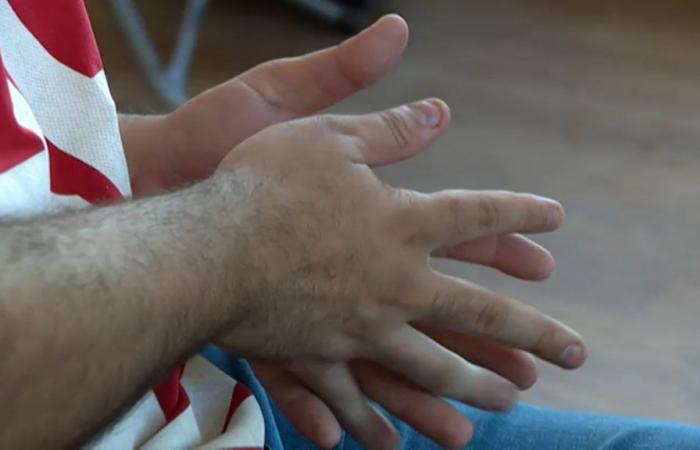“Everyone knows the major convulsive seizure, but besides that we can have seizures which are much more discreet, it can be a break in contact, it can be abnormal behavior and it is limited in time, it’s okay depend on the area of the brain that is affected by the abnormal discharge at the level of the nerve cells“, adds the professor.
Thus, those affected can also have a seizure.very brief, during which consciousness remains preserved, and which does not have much impact and for which there is no particular risk“just a crisis”which can be more disabling“.
Treatments, the vast majority of which are 100% reimbursed, work in approximately 60 to 70% of people affected. For people for whom it has no effect, there are other solutions.such as epilepsy surgery, vagus nerve stimulation or deep brain stimulation, or other techniques“, underlines Michel Ossemann.
As for the advice this expert can give to people with epilepsy, he sums it up in two points.
- Know yourself and your illness so as not to fall into stereotypes. “Patients are just as much victims of these stereotypes, because they often also have ignorance about the disease, like the rest of the population. We must therefore educate people so that they know their illness, know how to take care of it and avoid self-stigmatization..”
- Don’t hesitate to ask for help. “A structure with which we have to collaborate is the Institute for the Equality of Women and Men, which can help, most of the time, in mediation, by providing information to the employer. The other element is that sometimes, there are reasonable accommodations that must also be made at work. And these are things that can be put in place, in particular with the collaboration of occupational medicine..”
No one is safe
Epilepsy generally develops in two phases of our life: during childhood, of which certain forms of epilepsy can disappear in adolescence, and around the age of 60. “There, it is in parallel with cerebrovascular diseases, therefore strokes. In a number of cases, brain damage can cause scarring that can cause epileptic seizures.”
“But you can get it throughout your life and it can affect anyone.“, adds the expert.
In Belgium, between 70,000 and 80,000 people suffer from this disorder.
Wrongful dismissal?
To return to Antoine’s case, did his employer have the right to dismiss him suddenly and on the basis of his epilepsy? Olivier Wéry, labor law lawyer, dissects the situation.
As soon as an employer hires a person whose health or mobility requires adjustments, “there is an obligation to make the necessary adjustments as long as they remain reasonable“. Reasonableness being slightly subjective, it depends on the goodwill of the employer or the employment tribunal, if the dispute should be brought before the courts.
To avoid getting to this point, Olivier Wéry recommends above all else “to try to establish a dialogue between the worker and the employer“. “But basically, if things don’t go well, the worker must be able to consult either their union or a lawyer, and then submit an application to the labor court.“
“If the court ever comes to the conclusion that there was indeed discriminatory behavior on the part of the employer, in this case, the employer will have to pay compensation equivalent to six months’ remuneration to the worker for the dismissal. These six months are added to the traditional severance pay that the worker may have received as part of a notice period that he did not serve..”
Honesty must come first
As Antoine did during his job interview, an employee can report to his employer that he is subject to epileptic seizures. But in recent years, employees are no longer legally obliged to do so. One point however, “if you ever know very well that your type of disability will not allow you to fulfill the function, then obviously that is something else. There you have an obligation, it seems to me, to provide this information because it will completely change the situation and it risks distorting the path for the continuation of the collaboration“, adds the lawyer.
If by any chance you end up in court to resolve a dispute of this type, the verdict will strongly depend on the circumstances.
“Both statements are completely audible. The employer on the one hand will say that it is not only a question of reasonable accommodation because during epileptic seizures, for a certain moment, the person is completely completely incapable of working and may even be dangerous for herself, she could be dangerous for colleagues and the code of well-being at work also requires the employer to ensure the health of the worker in question and also to his colleagues.”
“On the other hand, the worker could say that he gave this information when he was hired and say that it was up to the employer to make the adjustments and put forward arguments such as: ‘If you ever ‘have hired, you must assume, it is undoubtedly because you felt that despite my handicap, I represented added value for you and you must ‘play the game”.”
Everything will therefore depend on the arguments put forward by each party, but dismissing a person on the sole basis that they are epileptic amounts to discrimination.
“It’s really the kind of case that is handled by a court depending on the circumstances and the precise details, who said what, when, what type of information was provided, what was the cost, what is the place occupied by the worker, is there a risk of danger for him or for others, so really these are all details that need to be judged on a case by case basis.“
For Antoine, although disillusioned, he will not go to court. He was able to find a job, but still wants to send a message. “When we have epilepsy, we are not missing an arm, a leg, or even I am not incapable of doing something in life. I do my sport like everyone else, I play in a club, I go running outside, I go to the cinema, I know how to do everything like everyone else. It’s really making people understand that I’m no different from anyone else.“






